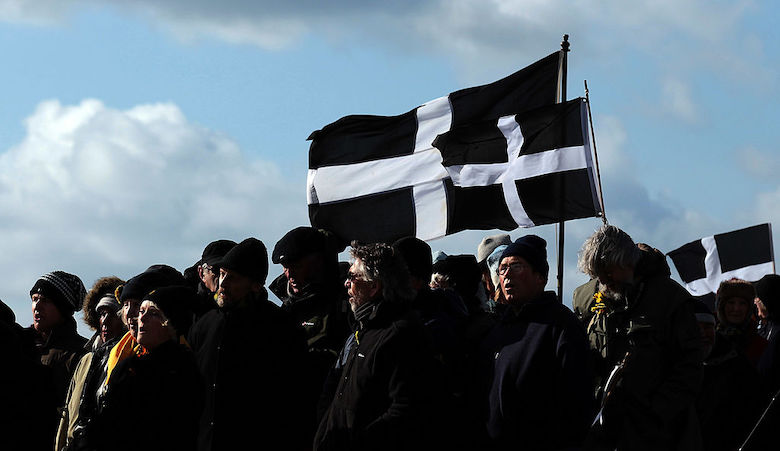The Office for National Statistics has been publishing interesting insights from the last census – perhaps to counter the bad press that censuses get at this time of year, forcing pregnant Jewish women to travel to municipalities in the West Bank – and its latest release shows that 18.1 per cent of people in Cornwall identify as ‘Cornish’. Whether as their national identity, ethnic group or, in a tiny fraction of cases, their main language, this is an increase from 13.8 per cent in the last census, in 2011.
All of these were write-in responses – despite a campaign by councillors and local MPs in Cornwall, there was no Cornish tick-box – and I suspect the percentage would be much higher if it was. (The ONS declined to include one on the grounds that demand for it was too localised an issue for a national census; 88 per cent of those identifying as Cornish live west of the Tamar.)
When Cornwall Council collects statistics, however, it does include ‘Cornish’, usually as the first option. When I first moved here, and had to fill in a Council form, I ticked it by accident – I was so used to marking the first box on such forms, and I suppose that was what you call a check-box for my privilege. Although it’s nothing compared to the privilege of youngsters who don’t have to scroll down repeatedly to find their year of birth.
When Cornwall Council collects statistics it does include ‘Cornish’, usually as the first option
I would not, of course, claim to be Cornish myself. I may have a St Piran’s sticker (a white cross on a black background) on my car, but that was there when I bought it; I kept it because I noticed other drivers were much keener on letting me merge into their lane if they spotted it. I would not presume to buy one myself, or any of the stickers with proud national slogans: ‘Kernow bys vyken’ (Cornwall for ever), ‘oneg hag all’ (one and all) and, of course, ‘Jam on First’.
I have never been able to work out how serious Cornish nationalism is. For every joke about the correct way to make a cream tea – or the time my Tesco delivery contained not the dozen turnips I had ordered but twelve Swedes (which are known as turnips in Cornwall) – there are more passionate discussions about how Cornwall was ‘England’s first colony’. I have on my desk a postcard from the latest anti-Israel protest in Penzance, with the St Piran’s flag overlaid on the Palestinian flag, with the not terribly subtle suggestion that both are victims of colonialism and genocide.
It is true that in the past Cornwall’s sense of nationhood was stronger: in the 16th century the Italian observer Polydore Vergil insisted that ‘the whole Countrie of Britain is divided into iiii partes; Englishmen, Scottes, Wallshemen, and the Cornishe people, which all differ emonge them selves, either in tongue, [or] in manners’. But, as the Cornish language died out, perhaps because most of the educated Cornish-speakers were wiped out during the Prayer Book Rebellion (which you could argue was a minor genocide), the sense of a Cornish nation became more nebulous. It is no coincidence that the parish of Penzance has the highest concentration of people identifying as Cornish – nearly a quarter of the population – and was also where the Cornish language clung on longest as a native tongue.
There have been attempts to revive Cornish as a spoken language, but so little written Cornish survives that most of it has had to be reconstructed. Cornish is similar to Breton, and so the modern variants of Cornish use Breton vocabulary or grammar to fill in the gaps – in much the same way as the boffins in Jurassic Park used DNA from frogs to pad out the dinosaurs’ genomes. Still, the ONS tells us that 565 people speak Cornish as their main language.
You could argue that Cornish nationhood is a matter of purely historical interest, but history still has an imprint on the Duchy. If you’ve ever been stuck on one of the tiny country roads and wondered why it is so difficult to get anywhere, this is a legacy of the fact that the Anglo-Saxon village system never got this far; the population is far less concentrated, even now, than anywhere in England. Likewise, the strong showing of the Liberal Democrat franchise in most of the Cornish constituencies is a reflection of how strong the Chapel was in the 18th century – and how it wasn’t replaced by unions (and hence the Labour party) in the 19th century – rather than any particular enthusiasm for their policies, whatever they are. (Having said that, Falmouth now has a university and so is probably home to a large enough concentration of middle-class people to go Labour at the next election.)
And physically, it feels different. The only thing I feel deprived of here is trees – bushes and shrubs grow more easily in the climate and acid soil; the ‘Cornish oak’ is the rhododendron – but the austere beauty of the countryside is its own reward. And possibly the reason for the rugged Cornish personality.
Or it could be that the Anglo-Saxons never got this far. I observed to the (very Cornish) grandmother of a friend of mine when I first arrived that the Cornish were, well, not English. And she looked furious: ‘The English! The English are German.’
Got something to add? Join the discussion and comment below.
Get 10 issues for just $10
Subscribe to The Spectator Australia today for the next 10 magazine issues, plus full online access, for just $10.



















Comments
Don't miss out
Join the conversation with other Spectator Australia readers. Subscribe to leave a comment.
SUBSCRIBEAlready a subscriber? Log in